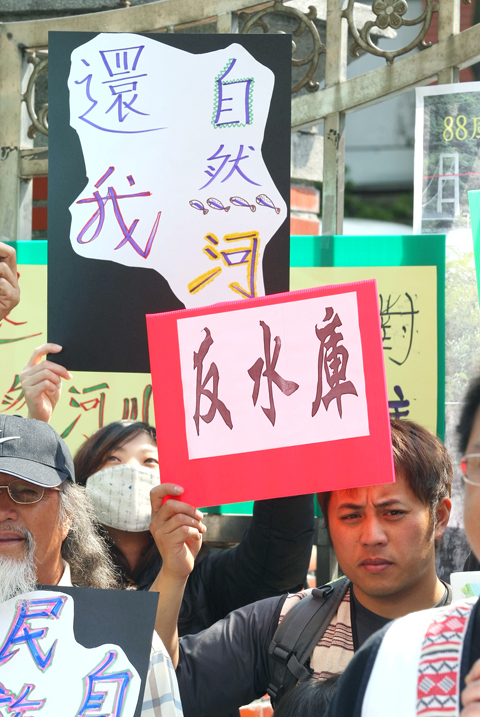Anti-dam protesters from central and southern Taiwan yesterday urged the government to stop all work on new reservoirs in their hometowns, saying construction would cause irreversible damage to the local ecosystem.
“What we are asking from the government is the chance to survive. All we want to do is protect our homeland and families from flooding and other catastrophes,” said Lai Mei-ching (賴美清), a longtime resident of Jianshih Township (尖石) in Hsinchu County and a member of the Atayal tribe.
Lai said the government's plan to build Bilin Reservoir (比麟水庫) and Kaotai Reservoir (高台水庫) means that more than 5,000 villagers, including her family, would be forcibly relocated.

PHOTO: CNA
She said construction would also have a negative impact on the local landscape.
In addition, she said, local residents would not reap any benefit from the two reservoirs because they would cater only to the water needs of the Hsinchu Science Park.
Anti-Pingsi Dam Alliance president Lin Seng-jen (林森仁) said the government would not need to spend billions of dollars building dams if it fixed other problems, such as leakage.
Lin said the global average of water loss between reservoirs and household taps was 18 percent. However, in Taiwan, this was significantly higher at 22 percent. Keelung City, in particular, suffers a loss of about 37 percent.
If the water company spent a fraction of the money intended for these projects fixing the leakage problem, it would not have to construct a dam that will put local residents at risk of flooding and mudslides if another storm like Typhoon Morakot — which killed more than 500 people in the south Taiwan last August — hits the nation, he said.

Alain Robert, known as the "French Spider-Man," praised Alex Honnold as exceptionally well-prepared after the US climber completed a free solo ascent of Taipei 101 yesterday. Robert said Honnold's ascent of the 508m-tall skyscraper in just more than one-and-a-half hours without using safety ropes or equipment was a remarkable achievement. "This is my life," he said in an interview conducted in French, adding that he liked the feeling of being "on the edge of danger." The 63-year-old Frenchman climbed Taipei 101 using ropes in December 2004, taking about four hours to reach the top. On a one-to-10 scale of difficulty, Robert said Taipei 101

A preclearance service to facilitate entry for people traveling to select airports in Japan would be available from Thursday next week to Feb. 25 at Taiwan Taoyuan International Airport, Taoyuan International Airport Corp (TIAC) said on Tuesday. The service was first made available to Taiwanese travelers throughout the winter vacation of 2024 and during the Lunar New Year holiday. In addition to flights to the Japanese cities of Hakodate, Asahikawa, Akita, Sendai, Niigata, Okayama, Takamatsu, Kumamoto and Kagoshima, the service would be available to travelers to Kobe and Oita. The service can be accessed by passengers of 15 flight routes operated by

Taiwanese and US defense groups are collaborating to introduce deployable, semi-autonomous manufacturing systems for drones and components in a boost to the nation’s supply chain resilience. Taiwan’s G-Tech Optroelectronics Corp subsidiary GTOC and the US’ Aerkomm Inc on Friday announced an agreement with fellow US-based Firestorm Lab to adopt the latter’s xCell, a technology featuring 3D printers fitted in 6.1m container units. The systems enable aerial platforms and parts to be produced in high volumes from dispersed nodes capable of rapid redeployment, to minimize the risk of enemy strikes and to meet field requirements, they said. Firestorm chief technology officer Ian Muceus said

MORE FALL: An investigation into one of Xi’s key cronies, part of a broader ‘anti-corruption’ drive, indicates that he might have a deep distrust in the military, an expert said China’s latest military purge underscores systemic risks in its shift from collective leadership to sole rule under Chinese President Xi Jinping (習近平), and could disrupt its chain of command and military capabilities, a national security official said yesterday. If decisionmaking within the Chinese Communist Party has become “irrational” under one-man rule, the Taiwan Strait and the regional situation must be approached with extreme caution, given unforeseen risks, they added. The anonymous official made the remarks as China’s Central Military Commission Vice Chairman Zhang Youxia (張又俠) and Joint Staff Department Chief of Staff Liu Zhenli (劉振立) were reportedly being investigated for suspected “serious